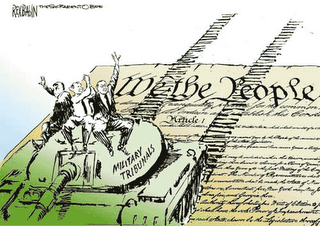Congress Okays Military Tribunals

Congress is working hard to look tough on terrorism in time for November elections.
Senate approves The Military Commissions Act of 2006 link, a bill that matches a House version to allow the CIA to continue interrogating (torturing) detainees suspected of terror ties. The House passed a bill of the same name, HR 6166 (Thomas link. The most recent Senate bill, S 3930 (Thomas link)
The bills passed mostly on party lines.
Most Democrats opposed the detainee bill, contending that Republicans were pushing through a sloppy measure to sell voters, but not because it made sense. GOP policies on national security "may have been tough, but they certainly weren't smart," said Senate Minority Leader Harry Reid.
"I'm convinced that future generations will view passage of this bill as a grave error," added Reid, D-Nev.
Added Sen. Dianne Feinstein, D-Calif., "We are being asked to consider legislation that will determine how our troops and personnel, foreign troops and personnel, as well as innocent bystanders will be treated when captured during conflict."
(from Anne Plummer Flaherty, Associated Press Writer, in the Globe article linked in the title to this post, September 29, 2006.
The bill sets standards for interrogating suspects, but through a complex set of rules that human rights groups said could allow harsh techniques that bordered on torture such as sleep deprivation and induced hypothermia.
It establishes military tribunals that would allow some use of evidence obtained by coercion, but would give defendants access to classified evidence being used to convict them.
The bill also expands the definition of "enemy combatants" mostly held at the U.S. prison at Guantanamo Bay, Cuba, to include those who provide weapons, money and other support to terrorist groups.
The Supreme Court struck down Bush's first system of military commissions to try suspects, leaving the process in limbo with no successful prosecutions since the September 11 attacks. Bush then faced a rebellion over his revised plan that three leading Republican senators said would allow abusive interrogations and unfair trials.
AGGRESSIVE INTERROGATIONS ALLOWED
After a high-stakes negotiation, Bush got much of what he wanted in the bill to continue the once-secret CIA program of detention and aggressive interrogations of suspects that critics said amounted to torture.
Democrats and some Republicans criticized the compromise for stripping detainees of rights to launch court challenges of their detentions.
Voting 51-48, Republicans beat an amendment that would have restored those rights and potentially derailed the bill. Four Republicans and one Democrat crossed party lines on the vote.
(from the Boston Globe, by Vicki Allen | September 29, 2006 (full story linked above in the text of this post). The Supreme Court decision referred to must be link for official slip opinion, dated June 26, 2006. Here is a nice summary of Hamdan from ScotusBlog, Marty Lederman, dated June 29, 2006.
The excellent political cartoon is by Rex Babin of the Sacramento Bee, available with other political cartoons at link, Daryl Cagle's Professional Cartoonists' Index.
No comments:
Post a Comment